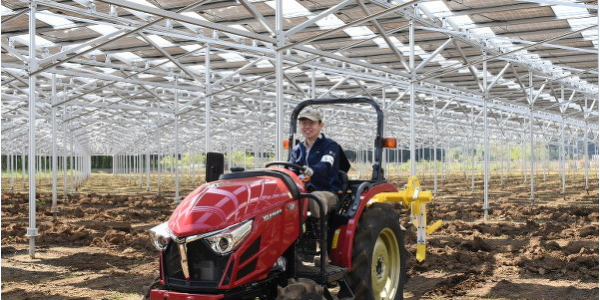CHIBA — A project here is taking green farming in a new direction, using the same farmland to produce both crops and solar energy.
Dubbed “solar sharing,” the technique is being pioneered by Chiba Ecological Energy Inc., a startup that emerged from Chiba University. At the company’s first agricultural-cum-solar farm in the Okido district of Chiba’s Midori Ward, some 10,000 square meters of fallow farm field have been covered with about 2,800 solar panels, capable of churning out around 830,000 kilowatt-hours per year — enough to power 168 regular households.
“We are aiming to create new villages with natural energy,” 34-year-old Chiba Ecological Energy President Takeshi Magami told the Mainichi Shimbun.
The solar panels in the company’s “Chiba Okido agri-energy No. 1 unit” are mounted on scaffolding 3 to 4 meters above the ground, enough space for Chiba Ecological executive Hironori Tomioka, 35, and two other employees studying farming to work on garlic plant cultivation. The field had been left fallow for about two years, so planting could not start immediately. However, soil improvement efforts are progressing, and they expect to start planting in the autumn.
Chiba Ecological Energy staff members are looking to expand the project area and use the solar energy to run a boiler and other equipment.
Magami studied environmental policy and environmental economics at Chiba University, going on to earn a Ph.D. in public affairs. He is now a part-time lecturer at the university’s Graduate School of Humanities and Studies on Public Affairs.
He started a solar sharing-related consulting business in 2012 and last year was involved in the construction of one of Japan’s largest solar sharing projects, a some 32,000-square-meter farm in Sosa, also in Chiba Prefecture.
“I want to harness new expertise to develop business knowhow in agricultural labor-saving and other areas, just as a young person should,” Magami said.
Fonte: (Mainichi Japan) / https://mainichi.jp






